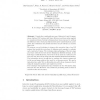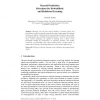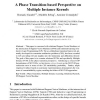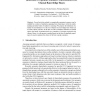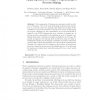139
click to vote
ILP
2007
Springer
15 years 8 months ago
2007
Springer
In this chapter, we describe a view of statistical learning in the inductive logic programming setting based on kernel methods. The relational representation of data and background...
111
Voted
ILP
2007
Springer
15 years 8 months ago
2007
Springer
Abstract. Despite the considerable success of Inductive Logic Programming, deployed ILP systems still have efficiency problems when applied to complex problems. Several techniques ...
137
click to vote
ILP
2007
Springer
15 years 8 months ago
2007
Springer
Research over the past several decades in learning logical and probabilistic models has greatly increased the range of phenomena that machine learning can address. Recent work has ...
129
click to vote
ILP
2007
Springer
15 years 8 months ago
2007
Springer
: This paper is concerned with relational Support Vector Machines, at the intersection of Support Vector Machines (SVM) and relational learning or Inductive Logic Programming (ILP)...
149
click to vote
ILP
2007
Springer
15 years 8 months ago
2007
Springer
We describe an application of inductive logic programming to transfer learning. Transfer learning is the use of knowledge learned in a source task to improve learning in a related ...
128
Voted
ILP
2007
Springer
15 years 8 months ago
2007
Springer
In reinforcement learning problems, an agent has the task of learning a good or optimal strategy from interaction with his environment. At the start of the learning task, the agent...
146
click to vote
ILP
2007
Springer
15 years 8 months ago
2007
Springer
Several activities related to semantically annotated resources can be enabled by a notion of similarity, spanning from clustering to retrieval, matchmaking and other forms of induc...
124
Voted
ILP
2007
Springer
15 years 8 months ago
2007
Springer
The management of business processes has recently received a lot of attention. One of the most interesting problems is the description of a process model in a language that allows ...
136
click to vote
ILP
2007
Springer
15 years 8 months ago
2007
Springer
Mode declarations are a successful form of language bias in explanatory ILP. But, while they are heavily used in Horn systems, they have yet to be similarly exploited in more expre...
190
click to vote
ILC
2007
Springer
15 years 8 months ago
2007
Springer
Two-way alternating automata were introduced by Vardi in order to study the satisfiability problem for the modal µ-calculus extended with backwards modalities. In this paper, we ...

